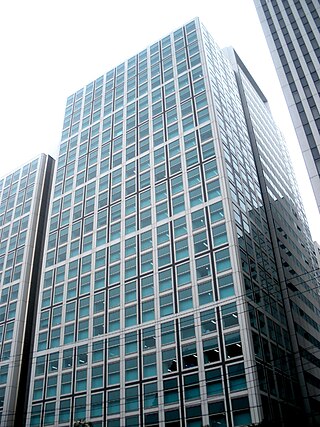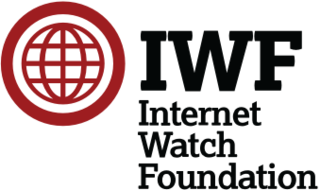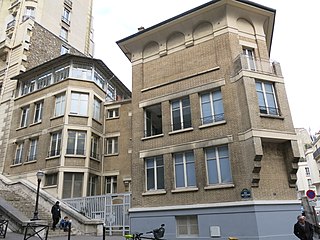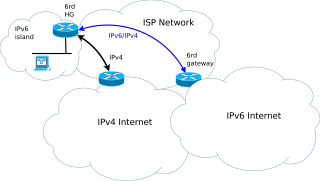Netscape Communications Corporation was an American independent computer services company with headquarters in Mountain View, California, and then Dulles, Virginia. Its Netscape web browser was once dominant but lost to Internet Explorer and other competitors in the so-called first browser war, with its market share falling from more than 90 percent in the mid-1990s to less than one percent in 2006. An early Netscape employee Brendan Eich created the JavaScript programming language, the most widely used language for client-side scripting of web pages and a founding engineer of Netscape Lou Montulli created HTTP cookies. The company also developed SSL which was used for securing online communications before its successor TLS took over.

Border Gateway Protocol (BGP) is a standardized exterior gateway protocol designed to exchange routing and reachability information among autonomous systems (AS) on the Internet. BGP is classified as a path-vector routing protocol, and it makes routing decisions based on paths, network policies, or rule-sets configured by a network administrator.

The Internet backbone may be defined by the principal data routes between large, strategically interconnected computer networks and core routers of the Internet. These data routes are hosted by commercial, government, academic and other high-capacity network centers, as well as the Internet exchange points and network access points, that exchange Internet traffic between the countries, continents, and across the oceans. Internet service providers, often Tier 1 networks, participate in Internet backbone traffic by privately negotiated interconnection agreements, primarily governed by the principle of settlement-free peering.

An Internet service provider (ISP) is an organization that provides services for accessing, using, managing, or participating in the Internet. ISPs can be organized in various forms, such as commercial, community-owned, non-profit, or otherwise privately owned.

Plusnet plc is a British triple play internet service provider (ISP) providing broadband, landline and mobile services. The company was founded in 1997 in Sheffield, England, and became a public limited company (plc) in July 2004 when it was floated on the Alternative Investment Market. On 30 January 2007, Plusnet was acquired by BT Group, but it continues to operate as a separate business. By December 2013, it had over 750,000 customers across the UK.

The World is an Internet service provider originally headquartered in Brookline, Massachusetts. It was the first commercial ISP in the world that provided a direct connection to the internet, with its first customer logging on in November 1989.
ESPN3 is an online streaming service owned by ESPN Inc., a joint venture between The Walt Disney Company and Hearst Communications, that provides live streams and replays of global sports events to sports fans in the United States.

So-net is a Japanese internet service provider operated by Sony Network Communications Inc., a wholly owned subsidiary of Sony.
Internet in Japan provides high quality services to more than 90% of the population and almost 100% of medium to large businesses, with mobile Internet on devices like smartphones being the most popular type of service. The Ministry of Internal Affairs and Communications (MIC) oversees the telecommunications, Internet, and broadcast sectors, but regulation of Japan's Internet industry is largely through voluntary self-regulation. There is little or no explicit censorship or restriction of Internet content, with the government respecting laws for freedom of speech and of the press, but there are concerns that the government indirectly encourages self-censorship practices. The Internet in Japan is not a singular medium and affects Japanese culture in a variety of ways as diverse groups of Japanese people interact online.

The Internet in the United States grew out of the ARPANET, a network sponsored by the Advanced Research Projects Agency of the U.S. Department of Defense during the 1960s. The Internet in the United States in turn provided the foundation for the worldwide Internet of today.
Internet censorship in the United Kingdom is conducted under a variety of laws, judicial processes, administrative regulations and voluntary arrangements. It is achieved by blocking access to sites as well as the use of laws that criminalise publication or possession of certain types of material. These include English defamation law, the Copyright law of the United Kingdom, regulations against incitement to terrorism and child pornography.

SSi Canada is a Canadian wireless broadband internet service provider primarily serving remote areas that lack terrestrial service options. SSi was established in 1990 by Jeffrey Philipp and is headquartered in Yellowknife, capital of the Northwest Territories. SSi is also a provider of Satellite Communication services, offered in locations that do not have terrestrial service options. They offer turnkey Internet systems to other ISPs. They have a local market serving all 25 communities in Nunavut and several in the Northwest Territories. These two territories account for 1/3 of Canada's landmass covering 3,439,296 km2 (1,327,920 sq mi). They also have an international market including Africa, Indonesia and Kiribati.
Internet in Azerbaijan is vulnerable to government monitoring and censorship. The ruling Aliyev family owns two of the three largest mobile operators in Azerbaijan. The ownership of the third large mobile operator is unknown, as it registered to an offshore company. The authoritarian regime in Azerbaijan has a history of blocking websites that criticize the government.

The Internet Watch Foundation (IWF) is a global registered charity based in Cambridge, England. It states that its remit is "to minimise the availability of online sexual abuse content, specifically child sexual abuse images and videos hosted anywhere in the world and non-photographic child sexual abuse images hosted in the UK." Content inciting racial hatred was removed from the IWF's remit after a police website was set up for the purpose in April 2011. The IWF used to also take reports of criminally obscene adult content hosted in the UK. This was removed from the IWF's remit in 2017. As part of its function, the IWF says that it will "supply partners with an accurate and current URL list to enable blocking of child sexual abuse content". It has "an excellent and responsive national Hotline reporting service" for receiving reports from the public. In addition to receiving referrals from the public, its agents also proactively search the open web and deep web to identify child sexual abuse images and videos. It can then ask service providers to take down the websites containing the images or to block them if they fall outside UK jurisdiction.
On 5 December 2008, the Internet Watch Foundation (IWF), a British watchdog group, blacklisted content on the English Wikipedia related to Scorpions' 1976 studio album Virgin Killer, due to the presence of its controversial cover artwork, depicting a young girl posing nude, with a faux shattered-glass effect obscuring her genitalia. The image was deemed to be "potentially illegal content" under English law which forbids the possession or creation of indecent photographs of children. The IWF's blacklist are used in web filtering systems such as Cleanfeed.

The International School of Paris (ISP) is a private international school based in Paris, France. It is a non-profit organization, and is managed by a board of trustees. Many members of this board are parents of ISP students.

6rd is a mechanism to facilitate IPv6 rapid deployment across IPv4 infrastructures of Internet service providers (ISPs).
Movie4k.to, formerly Movie2k.to, is a user-contributed video directory for television programs and films. It is an aggregation-website acting as a search index for online videos. In May 2013, Movie2k.to was shut down by the Motion Picture Association of America (MPAA) due to copyright infringement concerns, but shortly after reopened as Movie4k.to. It primarily serves English and German-speaking areas. However, the site is also no longer accessible in the UK, Denmark, and customers of some ISPs in Austria due to ISPs blocking the site.

The Paris Metropolitan Area includes a Japanese community. In 2013 the official number of Japanese residents in Paris was 16,277.
The precise number of websites blocked in the United Kingdom is unknown. Blocking techniques vary from one Internet service provider (ISP) to another with some sites or specific URLs blocked by some ISPs and not others. Websites and services are blocked using a combination of data feeds from private content-control technology companies, government agencies, NGOs, court orders in conjunction with the service administrators who may or may not have the power to unblock, additionally block, appeal or recategorise blocked content.











